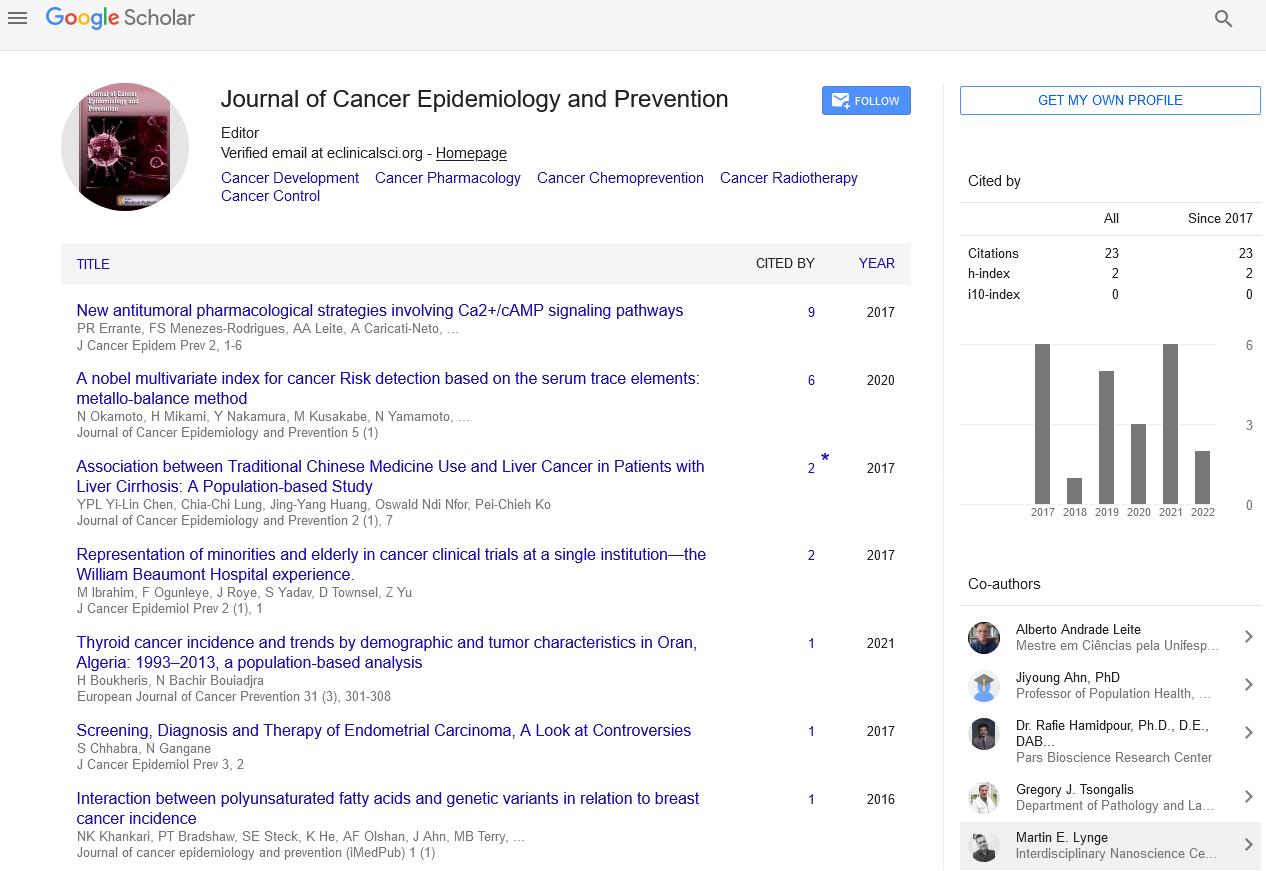Short Communication - (2024) Volume 9, Issue 2
Exploring the Role of Epidemiology Studies in Understanding and Controlling Diseases
Emily Thompson*
Department of Cancer Control, National Cancer Institute, USA
*Correspondence:
Emily Thompson,
Department of Cancer Control, National Cancer Institute,
USA,
Email:
Received: 29-May-2024, Manuscript No. IPJCEP-24-20844;
Editor assigned: 31-May-2024, Pre QC No. IPJCEP-24-20844 (PQ);
Reviewed: 14-Jun-2024, QC No. IPJCEP-24-20844;
Revised: 19-Jun-2024, Manuscript No. IPJCEP-24-20844 (R);
Published:
26-Jun-2024, DOI: 10.36648/IPJCEP.9.2.12
Introduction
Epidemiology, the study of the distribution and determinants
of health-related states or events in populations, plays a
crucial role in public health and medicine. By investigating
patterns, causes, and effects of health and disease conditions,
epidemiologists provide critical insights that inform healthcare
policies, interventions, and preventive strategies. This article
delves into the significance of epidemiology studies, their
methodologies, contributions to global health, and current
challenges in the field. Epidemiology studies are foundational
in identifying and understanding health issues at a population
level. Epidemiologists monitor disease trends over time and
across geographical regions to detect outbreaks, epidemics, or
potential pandemics early. This surveillance is crucial for prompt
public health responses. By examining factors associated with
disease occurrence (such as genetic, environmental, behavioural,
and socio-economic factors), epidemiologists uncover risk
factors that contribute to disease development. Epidemiology
evaluates the effectiveness of interventions, treatments, and
preventive measures. This evidence-based approach guides
healthcare policies and practices. Epidemiological studies
elucidate the natural history of diseases—how they progress,
their outcomes, and factors influencing disease progressionwhich
aids in treatment planning and patient management.
Epidemiologists employ diverse methodologies to investigate
health-related issues. These methodologies include. Snapshot
assessments of disease prevalence and associated factors in a
population at a specific time.
Description
Comparing individuals with a particular disease (cases) to
those without (controls) to identify factors contributing
to disease. Following a group of individuals (cohort) over
time to observe disease incidence and identify risk factors.
Gold standard for evaluating treatments or interventions by
randomly assigning participants to treatment or control groups.
Evaluating interventions at a community level to assess impact
and effectiveness. Synthesizing data from multiple studies
to provide comprehensive evidence on a particular topic or
intervention. Epidemiological research has had profound
impacts on improving public health worldwide. Epidemiological
studies have played pivotal roles in eradicating diseases like
smallpox and in controlling others such as polio through
vaccination campaigns and targeted interventions. Findings
from epidemiological studies inform healthcare policies on
issues ranging from vaccination schedules to environmental
regulations, shaping public health strategies at national and
international levels. Rapid identification and characterization
of emerging infectious diseases (e.g., COVID-19) are facilitated
by epidemiological surveillance and response systems, aiding in
containment efforts and mitigation strategies. Epidemiological
research guides strategies for managing chronic diseases (e.g.,
diabetes, cardiovascular diseases) by identifying risk factors and
improving prevention and treatment programs. By highlighting
disparities in health outcomes among different populations,
epidemiology contributes to addressing inequalities and
promoting health equity [1-4].
Conclusion
Access to high-quality, comprehensive data is essential but
often limited, especially in low-resource settings. Improving
data collection and sharing mechanisms is crucial. Modern
diseases often exhibit complex interactions between genetic,
environmental, and social factors, challenging traditional
epidemiological methods. Ensuring research ethics, including
privacy protection and informed consent, is paramount,
particularly with sensitive health data. Misinterpretation of
epidemiological findings in media and public discourse can
lead to misconceptions and mistrust, affecting public health efforts. Addressing global health threats requires international
collaboration, data sharing, and coordinated responses, which
can be hindered by geopolitical tensions and lack of resources.
The future of epidemiology holds promise amidst technological
advancements and evolving global health challenges.
Acknowledgement
None.
Conflict Of Interest
The author’s declared that they have no conflict of interest.
References
- Wang J (2018) Tumor microenvironment: Recent advances in various cancer treatments. Eur Rev Med Pharmacol Sci 22(12): 3855-3864.
[Crossref] [Google Scholar] [PubMed]
- Graham TA (2017) Measuring cancer evolution from the genome. J Pathol 241(2): 183-191.
[Crossref] [Google Scholar] [PubMed]
- Mullard A (2020) Addressing cancer's grand challenges. Nat Rev Drug Discov 19(12): 825-826.
[Crossref] [Google Scholar] [PubMed]
- Lorenzo AM (2014) Early epigenetic cancer decisions. Biol chem 395(11): 1315-20.
[Crossref] [Google Scholar] [PubMed]
Citation: Thompson E (2024) Exploring the Role of Epidemiology Studies in Understanding and Controlling Diseases. J Cancer Epidemiol Prev. 9:12.
Copyright: © 2024 Thompson E. This is an open-access article distributed under the terms of the Creative Commons Attribution License, which permits unrestricted use, distribution, and reproduction in any medium, provided the original author and source are credited.

